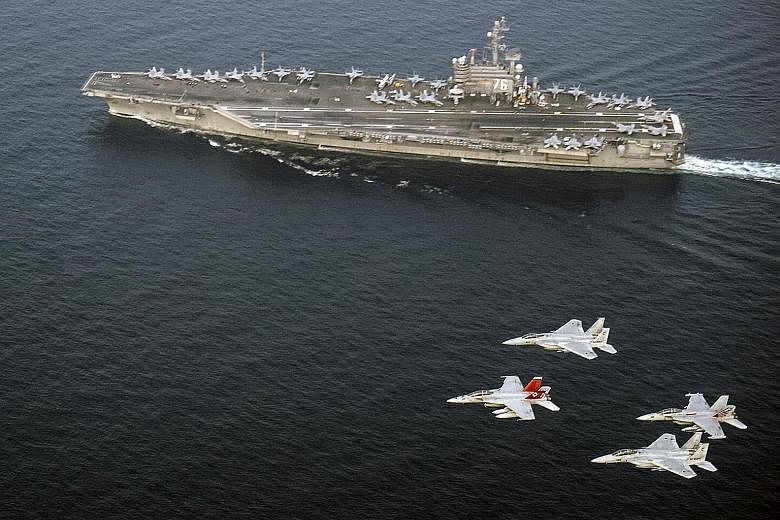The nuclear menace posed by North Korea was a leading concern among defence ministers at the annual Shangri-La Dialogue yesterday, amid rising tension over its recent series of missile tests.
US Secretary of Defence James Mattis highlighted the threat that North Korea's nuclear weapons posed to the region, and called on all countries - particularly China - to work towards the denuclearisation of the Korean peninsula.
Defence Minister Ng Eng Hen told reporters the instability on the Korean peninsula "weighed heavily on all ministers' minds" when they met at a roundtable during the annual security summit. North Korea has ramped up its missile tests, conducting a dozen tests this year. It fired at least one short-range ballistic missile on May 29, which landed in the sea off its east coast.
Dr Ng said the defence chiefs agreed that the threat has risen because of the increase in missile tests conducted by North Korea, and the improvement in its nuclear capability.
There was a realisation that the issue is now a global one because of the damage direct missile strikes could cause and the potential instability in the aftermath, he added.
In a statement yesterday, the ministers called for North Korea to take all necessary steps to de-escalate the situation, and to abide by its international obligations.
They also emphasised the need for all major players in the region to resume dialogue and manage tensions on the ground.
Australian Defence Minister Marise Payne said it is encouraging that China has condemned recent actions by North Korea, but added that it has the power to do much more.
"They do have a broad range of options to exert non-military pressure on North Korea, unlike any other country," she said yesterday.
Ms Payne urged China to continue on this path, pointing out that the country is a key source of foreign investment, energy and export income for North Korea.
Australia continues to work closely with the United States and other partners to apply diplomatic and economic pressure on North Korea in an attempt to curb its erratic behaviour, but China has unrivalled influence, she noted.
Last Friday, the United Nations Security Council unanimously adopted a US-drafted resolution to impose more sanctions on North Korea over its nuclear and ballistic missile programmes. China had agreed on the resolution.
Meanwhile, two US aircraft carriers - the USS Carl Vinson and the USS Ronald Reagan - carried out naval manoeuvres in the Sea of Japan (East Sea) with two Japanese vessels in a show of force.
At a session yesterday, a member of the Chinese delegation stressed China's commitment to resolving tensions on the Korean peninsula.
China - as a permanent member of the UN Security Council - has a major responsibility to stop North Korea from obtaining nuclear weapons, said Ms Yao Yunzhu, director emeritus of the Centre on China-American Defence Relations at the People's Liberation Army's Academy of Military Sciences.
"China will not be a bystander in the nuclear issue," she said.

